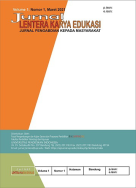Peningkatan Kualitas Pembelajaran Melalui Pelatihan Penelitian Tindakan Kelas Bagi Guru
Abstract
Full Text:
PDFReferences
Adelman, C. (1993). Kurt Lewin and the Origins of Action Research. Educational Action Research, 1(1), 7–24. https://doi.org/10.1080/0965079930010102
Brydon-Miller, M., Greenwood, D., & Maguire, P. (2003). Why Action Research? Action Research, 1(1), 9–28. https://doi.org/10.1177/14767503030011002
Connor, K. A. O., Greene, H. C., & Anderson, P. J. (2006). Action Research: A Tool for Improving Teacher Quality and Classroom Practice.
Dick Allwright, K. M. B. (1991). Focus On The Language Classroom An Introduction To Classroom Research For Language Teachers (2004th ed.). Cambridge University Press.
Haristiani, N., Septiana, A., & Kusrini, D. (2023). Japanese Language Teachers’ Perception and Implementation of Classroom Action Research (CAR). Chi’e: Journal of Japanese Learning and Teaching, 11(1), 1–12. https://doi.org/10.15294/chie.v11i1.65230
I.Arends, R. (1999). The What, Why, and How of Classroom Action Research. Nucl. Phys., 13(1), 104–116.
Johnson, A. P. (2005). A short guide to action research. Pearson.
Kille, K. J., Krain, M., & Lantis, J. S. (2008). Active learning across borders: Lessons from an interactive workshop in Brazil. International Studies Perspectives, 9(4), 411–429. https://doi.org/10.1111/j.1528-3585.2008.00345.x
Klehr, M. (2012). Qualitative Teacher Research and the Complexity of Classroom Contexts. Theory into Practice. JSTOR, 51(2), 122–128. http://www.jstor.org/stable/23263333
Macintyre, C. (2012). The Art of Action Research in The Classroom. David Fulton Publishers Ltd.
McGill, I., & Beaty, L. (2013). Action Learning. In Action Learning. https://doi.org/10.4324/9781315042480
Mctaggart, R. (1991). Principles for participatory action research. Adult Education Quarterly, 41(3), 168–187. https://doi.org/10.1177/0001848191041003003
Megayanti, T., & Fitria, D. (2020). Participatory Rural Appraisal Implementation in Identifying Public Open Space. Journal of Architectural Research and Education, 2(1), 19. https://doi.org/10.17509/jare.v2i1.23912
Mertler, C. A. (2013). Classroom-Based Action Research : Revisiting the Process as Customizable and Meaningful Professional Development for Educators. Journal of Pedagogic Development, 3(3), 38–42. http://uobrep.openrepository.com/uobrep/bitstream/10547/335968/1/Classroom-based+action+research+revisiting+the+process+as+customizable+and+meaningful+professional+development+for+educators.pdf
Mulyatiningsih, E. (2012). Modul Metode Penelitian Tidakan Kelas. Bandung Rosdakarya, 1–22. staff.uny.ac.id
Nazli, N. N. N. N., Khairuddin, S. M. H. S., Hasan, N. N., Abu, & Abdullah, A. S. (2021). Theory of Training Effectiveness Evaluation. 1959, 1–8.
Porath, S. L. (2016). Conceptual, pedagogical, cultural, and political dilemmas of implementing a constructivist workshop approach to teaching literacy. Teachers and Teaching: Theory and Practice, 22(7), 879–891. https://doi.org/10.1080/13540602.2016.1185822
Putriani, M. R., Wahyuni, S., & Noviani, L. (2016). Analisis kesulitan-kesulitan yang dialami guru ekonomi untuk melakukan penelitian tindakan kelas. Jurnal Pendidikan Bisnis Dan Ekonomi, 2(1), 1–17. https://jurnal.fkip.uns.ac.id/index.php/ptn/article/view/8781/6418
Riel, M. (2017). Understanding Collaborative Action Research. Center for Collaborative Action Research, February, 1–8.
Rothwell, W. J., & Kazanas, H. C. (2003). Planning and managing human resources : strategic planning for human resources management. HRD Press, Inc.
Sadimin, Hardyanto, W., & Slamet, A. (2017). Developing an E-Module-Based Classroom Action Research Training Model. The Journal of Educational Development, 5(3), 353–364. http://journal.unnes.ac.id/sju/index.php/jed
Sriyanto, S., Murniawaty, I., Nuryana, I., & Ismiyati, I. (2018). Peningkatan Profesionalisme Guru Ekonomi dalam Pembelajaran di SMA Kabupaten Semarang. JPPM (Jurnal Pengabdian Dan Pemberdayaan Masyarakat), 2(2), 357. https://doi.org/10.30595/jppm.v2i2.3413
Sutrisno. (2022). Guru Melaksanakan Evaluasi Pembelajaran Di Era. ZAHRA: Research And Tought Elmentary School Of Islam Journal, 3(1), 52–60.
Utami, A. D. W. (2013). Faktor-faktor determinan profesionalisme guru SMK bidang keahlian teknologi informasi dan komunikasi. Jurnal Pendidikan Vokasi, 2(2), 169–182. https://doi.org/10.21831/jpv.v2i2.1026
DOI: https://doi.org/10.17509/lekaedu.v3i2.63669
Refbacks
- There are currently no refbacks.

This work is licensed under a Creative Commons Attribution-ShareAlike 4.0 International License. View My Stats









